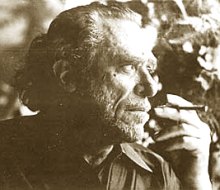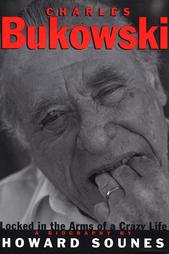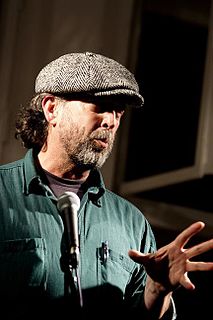Related Research Articles

Henry Charles Bukowski was a German-American poet, novelist, and short story writer.

The New American Poetry 1945–1960 is a poetry anthology edited by Donald Allen, and published in 1960. It aimed to pick out the "third generation" of American modernist poets, and included quite a number of poems fresh from the little magazines of the late 1950s. In the longer term it attained a classic status, with critical approval and continuing sales. It was reprinted in 1999.

Women is a 1978 novel written by Charles Bukowski, starring his semi-autobiographical character Henry Chinaski. In contrast to Factotum, Post Office and Ham on Rye, Women is centered on Chinaski's later life, as a celebrated poet and writer, not as a dead-end lowlife. It does, however, feature the same constant carousel of women with whom Chinaski only finds temporary fulfillment.
Neeli Cherkovski is an American poet and memoirist, who has resided since 1975 in San Francisco.
Michael Andre is a Canadian, disc jockey, poet, critic and editor living in New York City.

Harold Norse was an American writer who created a body of work using the American idiom of everyday language and images. One of the expatriate artists of the Beat generation, Norse was widely published and anthologized.
Nationality words link to articles with information on the nation's poetry or literature.

Howard Sounes is a British author, journalist and biographer.

South of No North is a collection of short stories by Charles Bukowski, originally published in 1973 as South of No North: Stories of the Buried Life by John Martin's Black Sparrow Press. South of No North also is a play that debuted off-Broadway in 2000 based on nine stories from the book.
Ole' magazine was one of the first small literary magazines produced by mimeograph to reach a nationwide audience. Published by Sacramento poet and editor Douglas Blazek, Ole' was at the heart of the Mimeo Revolution which saw underground presses publish non-establishment poets who could not get published in mainstream literary magazines such as Poetry Magazine.
Linda King is an American sculptor, playwright and poet. She is best known for having been the girlfriend of American writer Charles Bukowski for several years in the early 1970s.

Locked in the Arms of a Crazy Life, a book by Howard Sounes, published in 1998 by Grove Press, is a biography of American writer Charles Bukowski.
The Outlaw Bible of American Poetry, edited by Alan Kaufman, is an anthology of American underground poets spanning the post-war era to the present day. First published in 1999, the collection features work from several notable poets, including Jack Micheline, Patti Smith, Harold Norse, David Trinidad, Tuli Kupferberg, D.A. Levy, Bob Kaufman, Jim Chandler, Jim Brodey, Daniel Higgs, Jack Kerouac, Bonny Finberg, David Lerner, Richard Brautigan, Allen Ginsberg, Tom Waits, William S. Burroughs, Carlos ac Libera, Ken Kesey, Justin Chin, DianDi Prima, Charles Bukowski, and FrancEyE, among others. S.A. Griffin served as a contributing editor.
Whit Burnett was an American writer and writing teacher who founded and edited the literary magazine Story. In the 1940s, Story was an important magazine in that it published the first or early works of many writers who went on to become major authors. Not only did Burnett prove to be a valuable literary birddog for new talent, but Story remained a respectable though low-paying alternative for stories rejected by the large-circulation slick magazines published on glossy paper like Collier's or The Saturday Evening Post or the somewhat more prestigious and literary slick magazines such as The New Yorker. While Story paid poorly compared to the slicks and even the pulps and successor digest-sized magazines of its day, it paid better than most of, and had similar cachet to, the university-based and the other independent "little magazines" of its era.
Second Coming Press was a San Francisco-based small press founded by A. D. Winans that was in existence from 1972 to 1989. It specialized in publishing poetry and essays. Its published writers included Douglas Blazek, Charles Bukowski, Neeli Cherkovski, Art Cuelho, Paul Fericano, Gene Fowler, Hugh Fox, Linda King, Diane Kruchkow, Gerald Locklin, Al Masarik, Jack Micheline, Pablo Neruda, Morty Sklar and William Wantling.

Mark Terrill is a well-traveled American poet, translator and prose writer who has resided in Northern Germany since the mid-1980s.
Apostrophes was a live, weekly, literary, prime-time, talk show on French television created and hosted by Bernard Pivot. It ran for fifteen years from January 10, 1975 to June 22, 1990, and was one of the most watched shows on French television. It was broadcast on Friday nights on the channel France 2.
Nomad was an avant garde literary magazine that Anthony Linick and Donald Factor edited and published in Los Angeles between 1959 and 1962. The first issue came out in the winter of 1959. Linick and Factor were particularly drawn to the poetry and writing of the Beat Generation, who wrote of their own, frequently chaotic, lives.
Hostage is a 1985 spoken word and poetry album by Charles Bukowski. The single track was recorded live at Redondo Beach, California in April 1980.

Yannis Livadas is a contemporary Greek poet.
References
- ↑ Howard Sounes (1 December 2007). Charles Bukowski: Locked in the Arms of a Crazy Life. Grove/Atlantic, Incorporated. p. 98. ISBN 978-0-8021-9930-0 . Retrieved 16 November 2015.